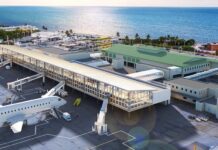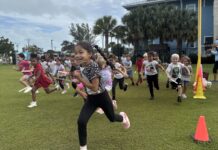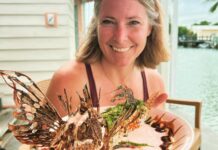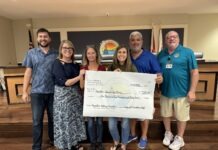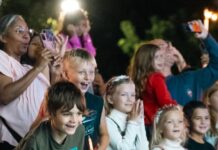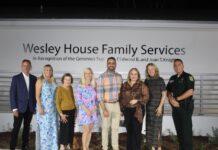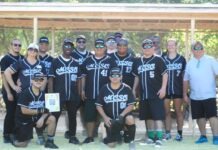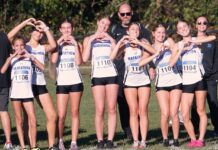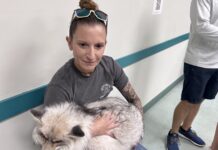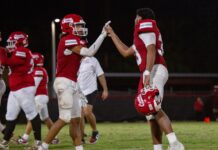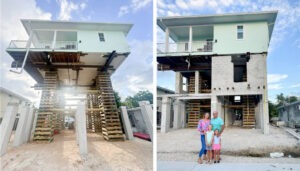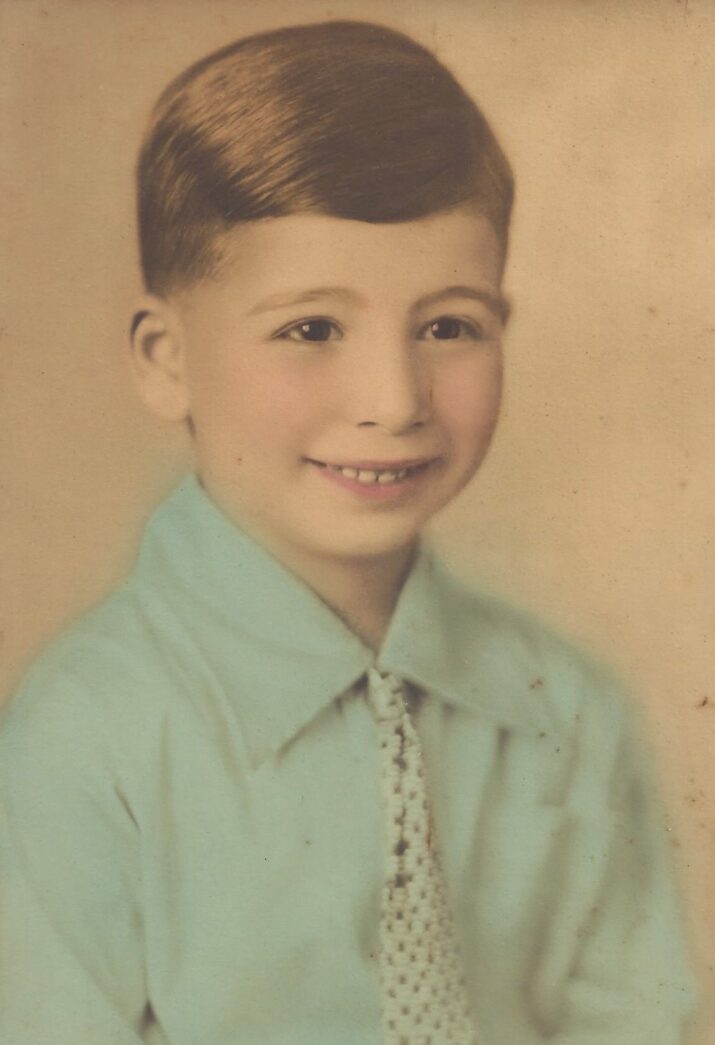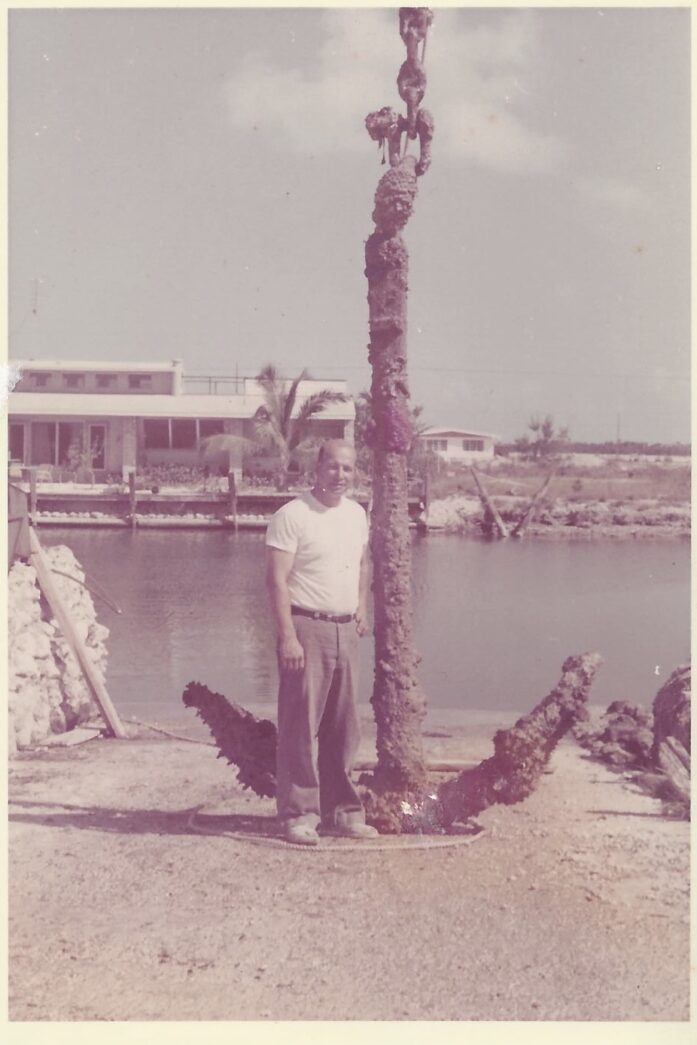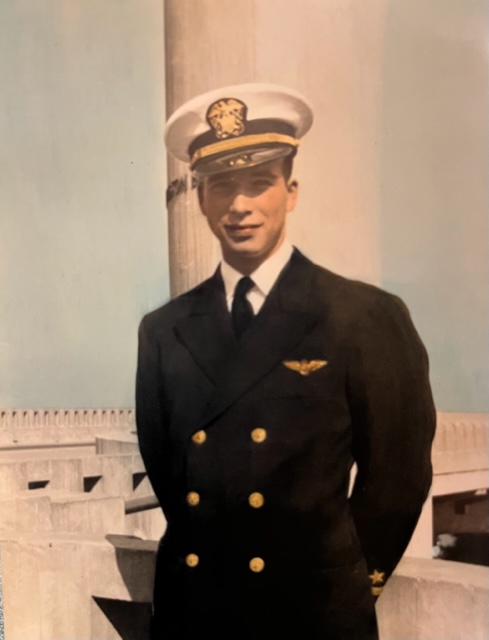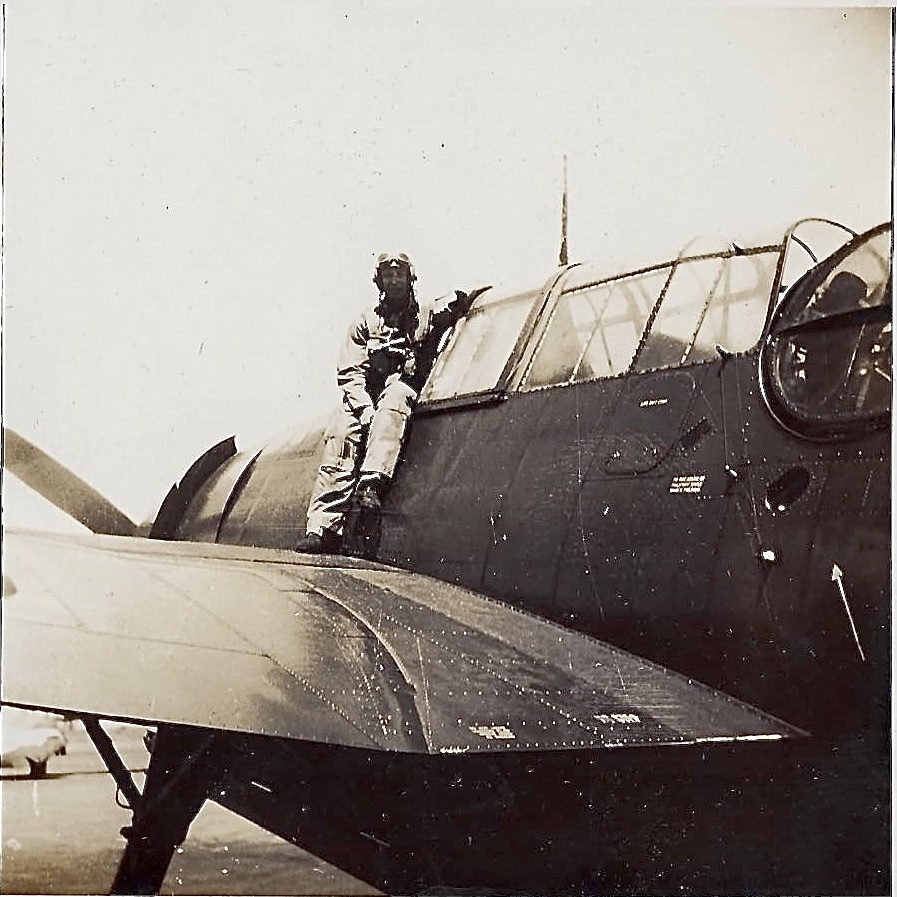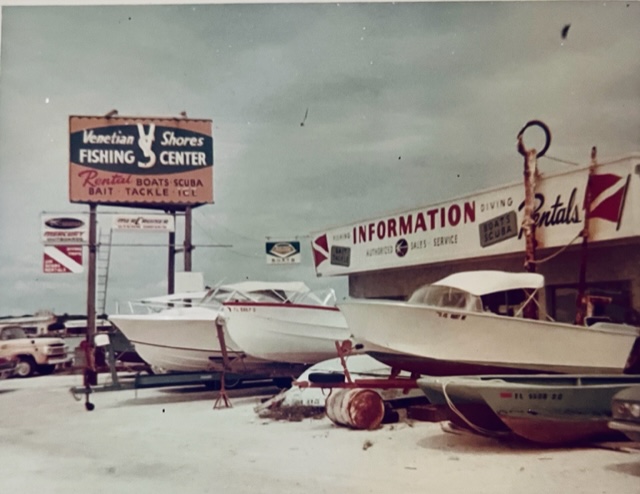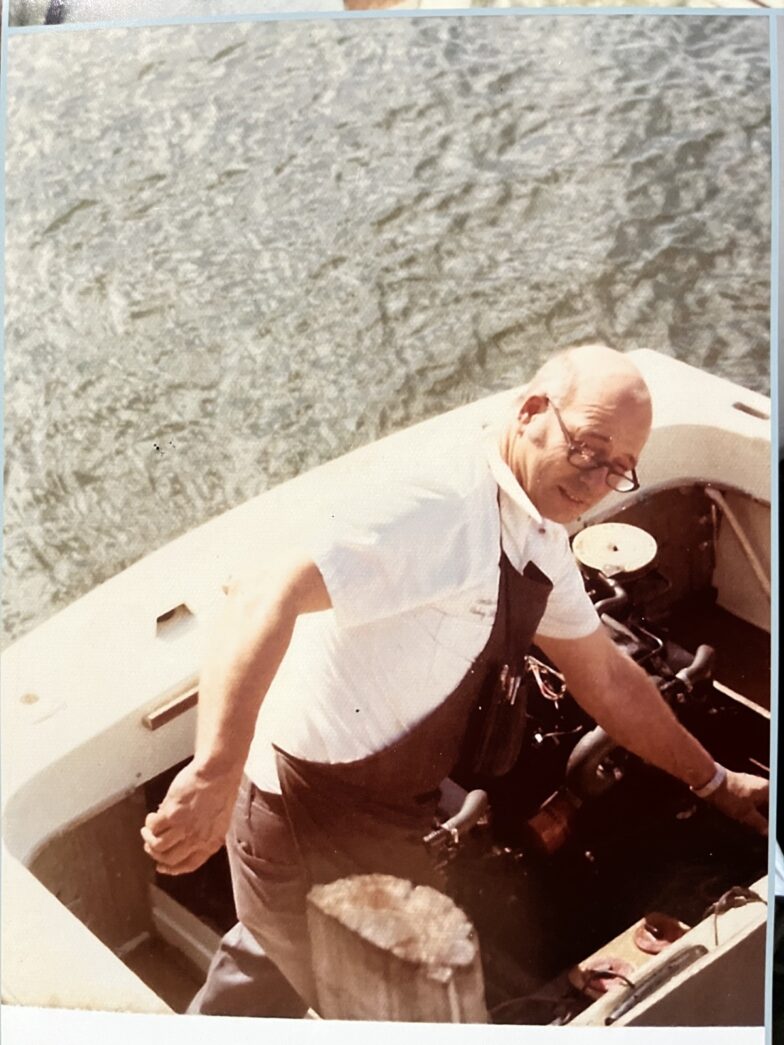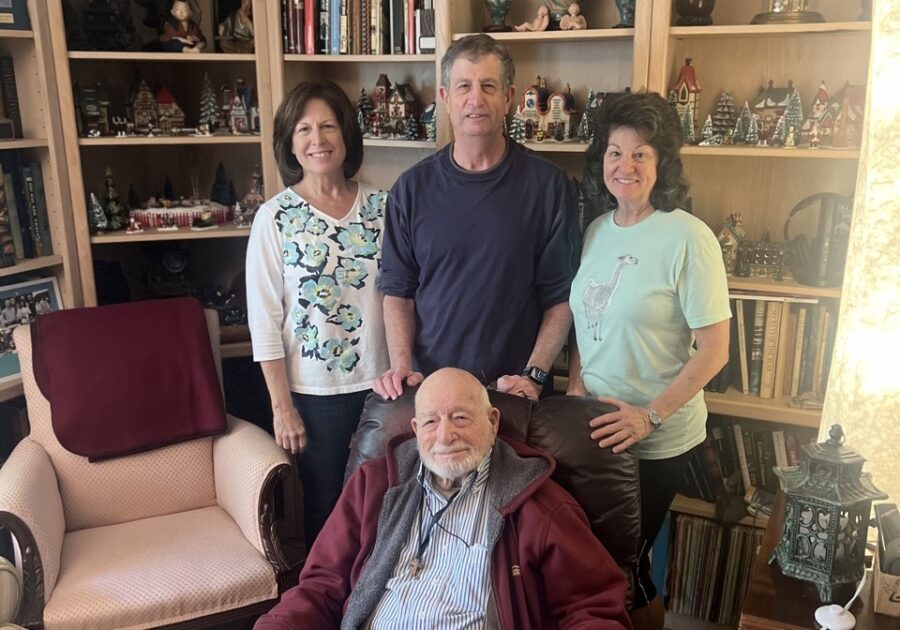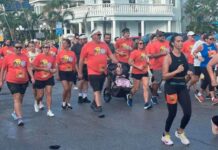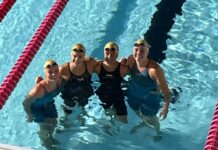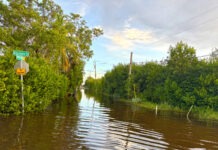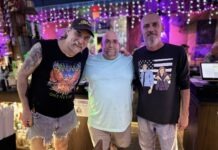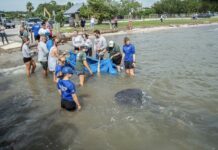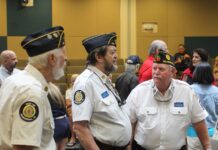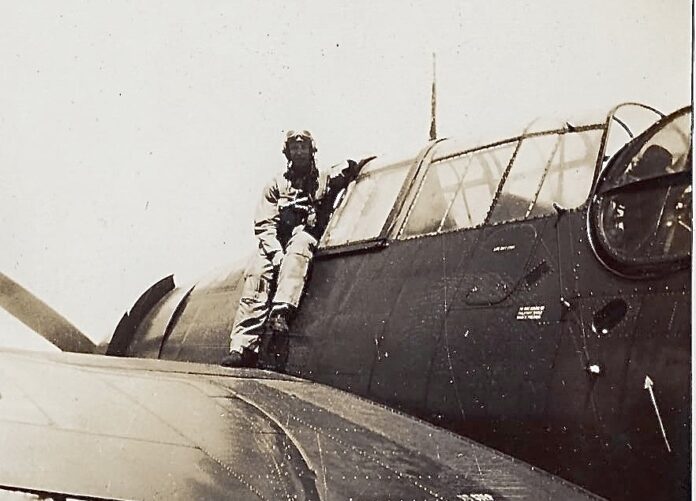
Retired U.S. Navy captain Dick Barnes has always found a way to make things work, and on May 10, the Islamorada resident turned 100 with a full recall of the important milestones that defined his amazing life.
Growing up in the Pacific Northwest, he fashioned fish hooks out of straight pins and constructed an underwater breathing apparatus with a hand-held pump he used to explore Lake Washington.
He repurposed military aircraft and Coast Guard Cutters to suit his needs and, after moving to the Florida Keys, he turned a hurricane-ravaged tackle shop into the first Mercury service center in the county. An avid diver, he needed a place to fill his air tanks — so he built one of the first filling stations.
His legend is long and detailed and nearly impossible to sum up in fewer than 10,000 words.
Just this past Tuesday, Upper Keys Rotary President Rob Stober presented Barnes with his latest award — a seventh Paul Harris Fellow — nearly 80 years after the former naval aviator, businessman and FKEC board member first flew over the Florida Keys while training for World War II combat.
“When flying for the Navy, you don’t get out to do much,” Barnes recalled from the recliner in his Islamorada home.
“I liked the area,” he said of his first impression of the Keys. “It just looked neat with the little islands and boats. I guess I always had that lust for the water in my veins.”
Shortly after the attack on Pearl Harbor, the 18-year-old electrical engineering student enlisted in the Navy. Not having enough college credits to qualify for flight school, he earned himself a spot in the Navy’s cadet program by scoring in the top 10 percent of the college equivalency exam. He spent the next few years training all around the country, including advanced bomber training in Fort Lauderdale and the Great Lakes, where he learned to land planes on decommissioned cruise ships in Lake Michigan. He grimaced when recalling the tight landing window because “the wings of the airplane were nearly as wide as the ship.”
Hunting Japanese subs behind the yoke of TBM torpedo bombers in the Philippines, he spent his down time fixing watches and flight instruments. He also began dabbling in salvage — repairing damaged Army Air Corps fighter planes and taking them for joyrides.
A few years later, his Naval assignment in Korea was to salvage combat-damaged aircraft (aka Flying Duds). He wasn’t yet qualified on jets, so he grabbed the instruction manual and made it work.
In between combat he completed a few more post-war, goodwill transit tours. One port stop included 10 days in Havana, Cuba where famed American writer Ernest Hemingway introduced Barnes and his fellow servicemen to Jai-alai, a sport involving the bouncing of a ball off a walled-in space with hand-held wicker cesta.
“He was a character.” Barnes said of the writer. “He sat down with us and got us top-shelf service — and we enjoyed it. He bought all the drinks — Cuba libres.”
After World War II, Barnes was released from active duty only to learn the young lady he promised himself to before the war didn’t wait and found herself another fellow.
“Boy … later was I happy!”
While attached to the Navy Reserves he paid a visit to cousins in Burbank, California, where he met his future bride, Barbara Jean Rickets.
“Here was this petite, brown-haired, brown-eyed lady,” Barnes said. “It just clicked. We spent the rest of the afternoon talking and then we went out for burgers. I dated her every day after that. By day 2 we knew this was it.”
Barnes and his new girlfriend Barb spent as much time with each other as possible. They even worked together and when they grew tired of waiting for their family’s consent they ran off to Las Vegas to elope.
The young couple settled into a non-typical routine after Dick procured a couple surplus Navy trainers he used to launch a crop dusting business — a profession he seemed to enjoy more for the benefits than the income.
“It was legalized flat hatting,” Barnes said. “We flew low and fast and your wheels are just barely above the top of the wheat. We could fly under power lines and between buildings.”
He had also been given a gold mine with the condition he would work it, so he and Barb spent the weekends panning for gold, but no evidence exists of the newlyweds striking it rich.
Children were born. First Dave arrived in Pensacola, where his dad served as a flight instructor, and then Nancy while they were stationed in Niagara Falls, where Barnes served as station pilot and liaison officer.
He made a name for himself by organizing an air show and got himself transferred to New Orleans, where he made it work again.
As his active duty military service wound down, Barnes was approached by a pilot friend who presented him with an opportunity to run a marina in the Florida Keys.
The young family decided to make it work in the Keys, so in August 1960 they moved into the apartment in the back of the Venetian Shores Fishing Center (currently occupied by FIU).
There were outboard engines, a gas tank, tackle and a small fleet of skiffs.
Just a few days later, the islands would brace for a tropical storm that would eventually hit the Keys as a Category 4 storm that tore part of the shop’s roof off and made the Snake Creek Bridge impassable for vehicles.
Two weeks after arriving in the Keys, he lost damn near everything. But in his haste to evacuate his family to Miami prior to the storm, Barnes managed to get the outboards high enough so they were undamaged by the tidal surge. He started a ferry service and made it work until the visitors returned to the Florida Keys several months later.
With the addition of Cindi, the family had grown to 5.
“It was the best upbringing for a kid down here,” says daughter Nancy Vetter. “We had access to everything — boating, fishing, scuba gear.”
Her dad even had giant concrete tanks for live shrimp; and her dad put another as close to the highway as possible so passing motorists could stop and see the crabs, small sharks and anything else the shrimpers would bring back in their nets — except for the octopus. They would always escape.
The next decades were filled with growing the business, salvaging shipwrecks, high-speed night skiffing across the mud flats, raising children and getting involved in the community. Barnes served on the board of directors for the Florida Keys Electric Coop for 15 years, founded the Upper Keys Sailing Club and has been a member of Upper Keys Rotary Club for nearly 40 years.
“They are one of the finest organizations I have ever been acquainted with,” Barnes said of both the Co-op and Rotary Club. “Especially this gang here. They are pretty good people there.”
When he first joined Rotary, the club was exclusively for men, but Barnes was happy to welcome the fairer sex and encouraged women to take on leadership positions with the sailing club.
“I am a women’s advocate,” Barnes added “A good woman is worth everything you can spend on her.”
The couple sold their business in 1987 and embarked on a retirement filled with RV trips around the country. But the bliss was short-lived as Barb passed from cancer two years later after 43 years of marriage.
Barnes was then introduced to a Jacksonville native, Ethel, who faithfully accompanied her new husband on trips to Italy, Hawaii and across the country as they secured lodging on military bases reserved for retired brass. “She was a great Navy wife,” Barnes said.
They enjoyed 23 years together, before Ethel passed in 2015.
The next year, Barnes became enamored with a fellow Rotarian Susan Lane. The couple spent the next three years volunteering for Rotary and the Florida Keys History and Discovery Center before she too passed.
Upon pinning Barnes with his latest Paul Harris fellow for continuing generosity, Stober said, “Dick’s life exemplifies what we should strive for: service to our country and community, success in business and love for family and friends.”
Those born in the latter half of the century may have difficulty understanding how the Florida Keys and the rest of the globe have changed since Capt. Richard Barnes began leaving his marks on the world.
“I like what I see in the world so far enough that I want to hang around for a while,” he said.

